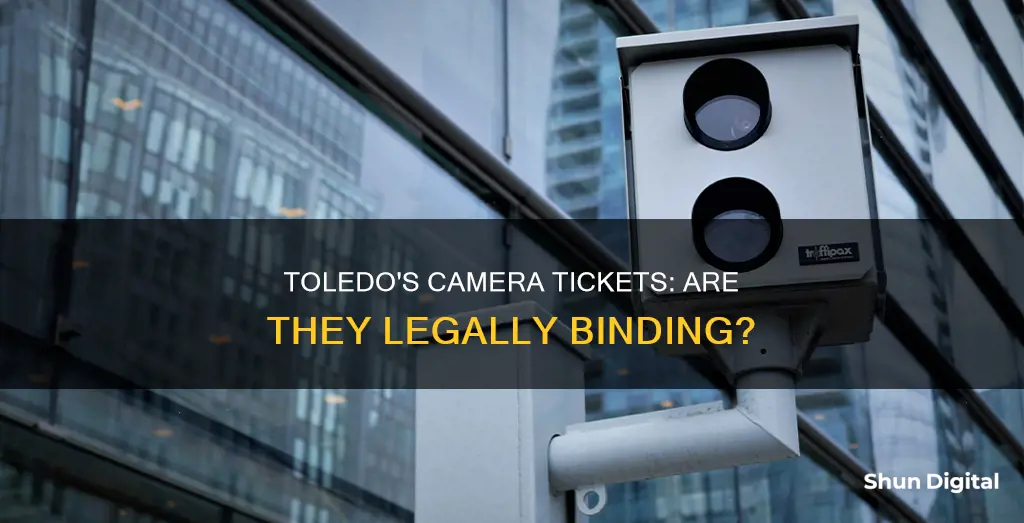
The use of traffic cameras to enforce road safety and issue tickets is a contentious issue in Toledo, Ohio. While the city argues that these cameras improve road safety and reduce violations, some motorists argue that the process of appealing tickets issued by these cameras is unlawful. The Ohio Supreme Court has weighed in on this issue, ruling that Toledo's administrative hearing process for traffic camera violations is unlawful and that such appeals must be handled by municipal courts. This decision has had a significant impact on the city's traffic camera program, leading to its suspension until further notice.
| Characteristics | Values |
|---|---|
| Location | Toledo, Ohio |
| Camera Type | Red-light and speed cameras |
| Ticket Cost | $120 |
| Appeal Process | Previously, appeals were heard by a city-appointed officer, but as of June 2020, the Ohio Supreme Court ruled that municipal courts have "exclusive jurisdiction" over appeals |
| Legal Status | As of June 2020, the camera program has been suspended until further notice |
What You'll Learn

The Ohio Supreme Court ruled against Toledo's camera tickets
The Ohio Supreme Court has ruled against Toledo's red-light camera program, finding that the city's use of administrative hearings for appeals of traffic tickets from red-light and speed-detection cameras is unlawful. The court's decision centres on the issue of jurisdiction, with the court ruling that municipal courts have "exclusive jurisdiction" to handle red-light camera violations, rather than city-appointed officers.
The case, Magsig v. The City of Toledo, was brought by Susan Magsig of Woodville, Ohio, who received a $120 fine for an alleged speeding violation from an automated speed camera near Toledo ProMedica hospital. Magsig's attorney, Andrew Mayle, argued that the process for appealing the fine was unlawful, as it did not allow for an appeal to the local municipal court. Instead, appeals were heard by a city-appointed hearing officer, who is not a judge but merely a non-judge selected by the city.
The Ohio Supreme Court agreed with Magsig's argument, ruling that a change in state law that took effect in July 2019 requires municipal courts to decide all civil cases concerning traffic violations, including those from traffic cameras. The court's decision was unanimous, with Justice Judith L. French writing that the Ohio General Assembly "clearly and unambiguously reserves for municipal courts exclusive authority to adjudicate every civil traffic-law violation."
As a result of the court's decision, the City of Toledo has suspended its red-light camera program, including handheld cameras, until further notice. The city law director is working to switch the appeals process over to the municipal court, and all current and future appeals will be dismissed. While the city disagrees with the court's ruling, it acknowledges that the automated traffic enforcement cameras will continue to operate, as they believe they help to improve safety on the roads.
The decision by the Ohio Supreme Court has implications for other cities in Ohio that use similar types of hearings for red-light and speed camera violations. It also highlights the ongoing debate between cities and the legislature over the use of traffic cameras, with lawmakers criticising cities for overzealous use of the cameras as a way to make easy money, while cities defend their use as a necessary tool for maintaining safety.
How Long to Charge Mobius Cameras Fully?
You may want to see also

The city's administrative hearings are unlawful
The city of Toledo's administrative hearings have been deemed unlawful by the Ohio Supreme Court. In the case of Magsig v. The City of Toledo, the Court ruled that the city's process of handling red-light camera violations was unlawful. The Court found that the city's use of administrative hearings, with a city-appointed officer deciding on appeals, was not valid. The Court's decision was based on a change in state law that took effect in 2019, which gave municipal courts "exclusive jurisdiction" over noncriminal traffic-law adjudications.
This ruling means that the city of Toledo can no longer conduct its own quasi-judicial proceedings for red-light camera violations. Instead, these cases must be handled by the municipal courts. The decision was a unanimous 7-0 ruling by the Ohio Supreme Court, which found that the revised 2019 law clearly stated that municipal courts had exclusive authority to decide all civil cases concerning traffic violations, including those from traffic cameras.
The case was brought to the Court by Susan Magsig, a motorist from Woodville, Ohio, who received a $120 fine for an alleged speeding violation from an automated speed camera near Toledo ProMedica hospital. Magsig argued that the process of appealing the fine through a city-appointed hearing officer was unlawful and that her case should be heard by the municipal court. The Court agreed with Magsig's argument and granted her request to block the city from conducting the administrative hearing.
The city of Toledo had previously argued that its administrative hearing process was lawful, citing a Supreme Court ruling in 2014 (Walker v. Toledo) that upheld the use of these hearings. However, the Court noted that the law had changed since 2014 and that the revised law clearly gave municipal courts exclusive authority over civil traffic-law violations. As a result of the Court's decision, the city of Toledo has suspended its red-light and handheld camera violations program until further notice.
Troubleshooting Camera Battery Exhaustion Issues
You may want to see also

Toledo's camera program is suspended
Toledo's red-light and speed camera program has been a controversial topic, with the city defending its use as a means to improve road safety and opponents arguing that it is a money-grabbing scheme. The program allows automated speed cameras to detect speeding violations and send fines to the vehicle owners. However, in a significant development, the city has recently suspended its camera program.
The suspension comes in the wake of a legal challenge by Susan Magsig of Woodville, Ohio, who received a $120 fine for an alleged speeding violation from an automated speed camera. Magsig disputed the validity of the fine and took her case to the Ohio Supreme Court, arguing that the city's appeal process was unlawful. She contended that the city's use of administrative hearings with a city-appointed officer went against the revised 2019 law, which granted "'exclusive jurisdiction' to municipal courts over non-criminal traffic law adjudications.
The Ohio Supreme Court agreed with Magsig's argument and ruled in her favor, striking down Toledo's red-light camera program. The court's decision affirmed that the city's administrative hearings were unlawful and that the municipal courts had the sole authority to handle red-light camera violations. As a result, the city of Toledo has been forced to suspend its camera program until further notice.
The city law director is now working to transition the appeals process to the municipal court. All current and future appeals related to camera violations will be dismissed, and the city will have to adapt to the new requirements. This suspension is expected to impact other cities' red-light programs that employed similar administrative hearing processes.
While the camera program has been contentious, it is important to note that traffic cameras are still operational in some parts of Ohio, such as Dayton and Akron. However, the number of traffic cameras in the state has decreased due to legislation requiring a law enforcement officer to be present at camera locations, making the process more costly for municipalities.
Mounting a Battery Plate: A Guide for Cameramen
You may want to see also

Motorists must still pay or appeal
Motorists who receive a ticket from a traffic camera in Toledo, Ohio, must still pay or appeal the ticket, despite the fact that the Ohio Supreme Court has ruled that the city's administrative hearing process for these violations is unlawful.
In June 2020, the Ohio Supreme Court ruled in Magsig v. The City of Toledo that municipal courts have "exclusive jurisdiction" to handle red-light camera violations. This means that a city-appointed officer cannot decide on appeals to red-light camera violations, and instead, these cases must be heard by a municipal court.
The case was brought by Susan Magsig of Woodville, Ohio, who received a $120 fine for an alleged speeding violation from an automated speed camera near Toledo ProMedica hospital. She argued that the process for appealing the fine was unlawful and took her case to the Ohio Supreme Court. The Court agreed with Magsig and granted a writ of prohibition, suspending the administrative hearing that had been scheduled for November 19, 2019.
While the Court's decision means that Toledo's administrative hearing process for traffic camera violations is unlawful, it does not prevent the city from operating a traffic camera program. Motorists who receive a ticket from a traffic camera in Toledo still have the option to pay the fine or appeal the decision. If they choose to appeal, they must follow the process outlined by the city, which may include filing an appeal with the municipal court.
It is important to note that failing to pay or appeal a traffic camera ticket in Toledo can result in additional penalties and fees. Therefore, motorists who receive a ticket should take prompt action to resolve the violation, even if they believe the ticket is unfair or unlawful.
Battery Cells for Camera Drones: How Many Do You Need?
You may want to see also

Ignoring tickets can affect credit scores
While Toledo's camera tickets have been deemed unlawful by the Ohio Supreme Court, it is still important to understand the implications of ignoring tickets on your credit score.
Unpaid fines, tickets, and fees can damage your credit score if they are sent to collections. While public record information such as civil judgments and parking tickets no longer appear on credit reports, collections related to these can still negatively impact your credit.
If you don't pay a ticket on time, it may be sent to a collection agency, and collection accounts can remain on your credit report for up to seven years. This can affect your ability to obtain loans or favourable interest rates in the future.
Even if a ticket is relatively inexpensive, it's a good idea to pay it off promptly. This is because the effect of collections on your credit can vary based on the scoring model used, and some lenders may use older models that do not ignore small-dollar collection accounts.
Additionally, unpaid tickets can lead to other consequences, such as a suspended driver's license, vehicle impoundment, or even an arrest warrant.
To avoid these issues, it's best to take care of unpaid tickets promptly and ensure you don't ignore any notices or appeals processes that could help resolve the issue. By staying on top of these matters, you can maintain a positive credit history and avoid unnecessary complications.
Finding Adobe Camera Raw Files: Location and Access
You may want to see also







